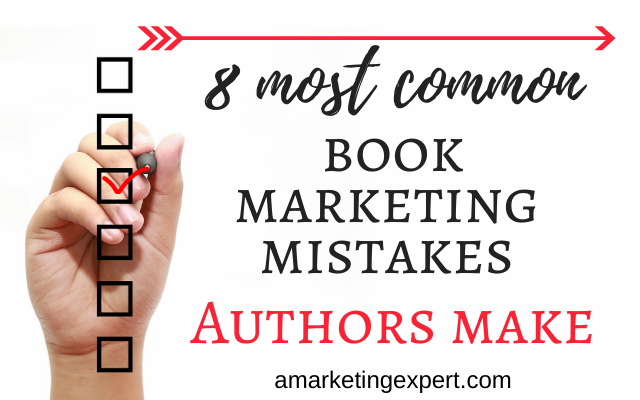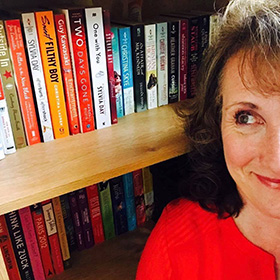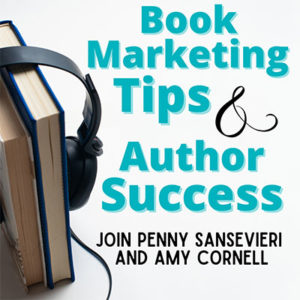People often love to talk about book marketing mistakes, and believe me I’ve seen a lot of them.
I don’t mind talking about what authors are doing wrong when it comes to marketing their books, but it’s also helpful to offer a solution to what is generally considered a consistent issue.
So with each of these common book marketing mistakes, I’ve also dug into some solutions and ideas to help you overcome whatever issue you’re facing, and propel you and your book forward.
Let’s dig in!
Not really knowing your market:
This is a big one, which is why I’ve led with it. Not understanding your market and what your market needs/wants is a bigger deal than most authors think. One of the first things successful authors do is read books in their markets. A lot of them. Knowing the nuances of your market, who is writing what, and what your reader wants and needs is crucial to the success of a book.
Solution: Spend some time getting to know your particular landscape, buy books, loan them from Kindle Unlimited, and start to dig into what other authors are saying in your market.
How this benefits your book marketing: Understanding what’s already out there and understanding what’s being published could help you not only define your particular niche, but also help create a book readers really need.
Is there an area of this market segment that isn’t being addressed that should be?
And if there’s no book on the subject you’re about to write about, maybe it’s a good time to find out why. The last thing you want to do is write and publish a book no one wants.
Not understanding your genre:
Even though this is pretty similar to the first point above, it’s really worth mentioning here. Books have genres for a reason.
It’s not just so your local bookstore or Amazon can shelve these books in the correct spot, it’s so your reader can find you, too. And readers having particular needs, depending on the genre. Not all business books are created equal and the genres and subgenres vary greatly.
The same can be said for memoir, any non-fiction, and in particular fiction. If an author comes to me for marketing and says they have no idea who their market is, or what their genre is, that sends up a red flag.
Book genres have specific markers that appeal to their reader. For example a reader of paranormal fiction needs a certain set of things to happen for it to truly be paranormal. Knowing the particulars of your genre will not only help you write a better book, but it’ll help you sell more.
Solution: Same as above: read in your market. Get to know your genre. If you’ve hired a good editor, they should be able to guide you as well. Most content editors know genre nuance very well.
How this benefits your book marketing: Marketing to the wrong readers is like trying to sell a puppy to a cat person. They may think the puppy is cute, but at the end of the day no about of marketing, reviews, or Amazon ads will get a cat person to buy a dog. Marketing to the wrong people is like taking your entire marketing budget and throwing it out the window. I’m not kidding.
Not having an editor:
I’m not even sure why this is still a “thing” in publishing – books being published with zero editing is like sending a resume to an employer that’s full of typos.
You probably won’t get the job, or any job.
If you decide to shortcut your book and skip the editing, you should also skip the marketing, too. Because you really don’t want anyone reading an unedited book, I don’t care how good your Word program points out your typos. Also, don’t use editing software. Hire a real person who can give you solid feedback.
Solution: Hire a content and copy editor. You need both, trust me.
How this benefits your book marketing: If you’ve ever seen books on Amazon with a series of one-star reviews it’s probably because someone skipped or skimped on the editing.
Not using a professional cover designer:
There’s a lot of ways to self-design your own cover and let me say this as clearly as I can: Don’t.
People absolutely judge a book by its cover, so you want a seasoned book cover professional to create something readers will love.
Good book cover designers don’t have to cost you a fortune, but they’re worth every penny of your investment.
This is also a warning against friends and associates that are artists, illustrators, marketing professionals, etc. because while it seems they should know what to do because they’re excellent in their field, it doesn’t mean they’re up to date on what’s working in publishing, and what specific rules to follow for cover design. Being good in one creative field does not always translate to another and your book cover is so critical – it’s not worth the risk.
That being said, you can take a design or concept someone has created for you, or that you’ve done yourself, and offer it up to a cover designer as inspiration!
Here’s a great list of professional book cover designers curated by The Creative Penn.
Solution: If you have a book that’s already out and the sales aren’t great, maybe you need a cover redo or maybe a cover polish to help spiff up your book. I’ve seen this a lot with authors who realized, too late, that their cover wasn’t up to par. If you haven’t published your book, then please hire a cover person.
How this benefits your book marketing: Good covers sell books, yes blurbs sell books, great book descriptions sell books, so do reviews. But if you want book sales, you’ll need a great cover to get you past the gatekeepers and to get you more book sales on Amazon.
Not having a website:
I know it’s tempting to let your social media be your website placeholder but with so many options to do websites these days, there’s really no excuse to not have one. A website is your branding, it’s part of your author persona, and for some it’s a business. Don’t delay getting a website until the book starts selling, or whatever long-term goal you have. Your website should launch ahead of the book launch, actually.
Solution: If it’s a money-thing (meaning you don’t have thousands to invest in a website), consider places like Squarespace where you can design something that’ll keep you going for a while, if you own the domain name you can always put up a professionally designed site later.
How this benefits your book marketing: I never liked the idea of entrusting readers, fans and followers to social media platforms. Being at the mercy of sites like Facebook, Instagram and Twitter just seems scary to me. Having a website will help you build your reader list (your newsletter!) and speak to fans through your blog. A website is a great place for readers to go to get to know you better!
Starting your book marketing too late:
While I’ve jumped into book marketing projects late in the life of a book, it’s not the best idea to delay book promotion.
Things like blogger reviews and media are all pretty timely and should be the first things to get your attention when you’re starting down the book publicity road. As books age they get harder to market, not impossible certainly but your options really dwindle as books age.
Solution: start planning your book marketing ahead of your book launch, even if it’s just a month ahead of your launch. You don’t have to start months ahead of time, but a little planning buffer is always a good thing.
How this benefits your book marketing: A friend once gave me the analogy of an airplane taking off. The bigger the plane, the longer the runway. But even small planes need some road to build speed and take off. Your book is the same way.
Whether your goals are big and grandiose or small and conservative, having some time ahead of your book launch is really key to promotion. Give yourself enough time to get out ahead of your book launch and put pitches out there for reviews, interviews, media placements, etc.
Delaying writing/publishing your next book:
I know it’s tempting to want to wait and see if your book brings in a profit before you decide to publish the next one, but that’s a real mistake.
Often the best way to market your first book is with your second, the best way to market your first and second book is with your third and so on. Another reason is that building readership is a solid way to get more sales and it’s easier to do that if you keep books in the pipeline.
This doesn’t mean you need to publish a book a month, but one a year or two a year would be really ideal.
Solution: Plan out your book marketing to incorporate new books and plan ahead for these books, including the cost of production so you can plan out when you can reasonably afford an find time to produce and write your books.
How this benefits your book marketing: Having multiple titles adds a layer to book promotion that you can’t find with a one-book author.
Having lots of books in your library, even just two, can be incredibly helpful when it comes to marketing. Pricing discounts on older books help drive attention to all of your titles, whether they’re in a series or not.
You have a lot more marketing options each time you release a new book. You also frankly learn more. With each new book marketing also gets easier, too. Your first book is always and often your hardest.
Publishing to make money or pay bills:
We all want to make money with our books, I get it.
But publishing is a business and as such, it’s pretty front-loaded investment. Getting into book publishing to make money can be a rough road, most books don’t start to see an ROI (return on investment) until you’re well into your book marketing journey.
Also, publishing with a singular goal of selling books is not a great goal. Why? Because not everything you do will net you a book sale (or sales), often good book promotion is a layering process. As one effort layers on top of another you begin to build momentum for book sales.
Solution: It’s discouraging, I 100% get it, but having your eye on other goals is a better and more positive way to market a book. Also having a goal of, let’s say, adding 10 or 20 more reviews to your Amazon page will impact your book sales at some point.
Create focused goals on steps you know you need to take to gain some book marketing traction. Maybe it’s getting more engagement on your social media channels to help build your audience, that’s a great goal and again, book marketing is cumulative.
The more pieces that are in place, the more the wheels of book sales start to kick in.
How this benefits your book marketing: Honestly one of the biggest assets to your book marketing is your attitude. Staying positive and focused on the wins, the reviews you got, the blogger who liked your book, these are the things that keep you going.
Over the years I’ve seen far too many incredibly talented authors lose their book marketing mojo by staying hyper focused on book sales. Selling more books is a big, hefty goal, and it’s really an end goal for most authors. The micro-goals are what will keep the wheels of your book marketing car spinning in the right direction!
I hope you found this helpful and insightful, and I hope the positive spin can help you turn your possible mistakes, into book marketing wins!
Resources and Free Downloads
Check out our book marketing podcast!





0 Comments
Trackbacks/Pingbacks